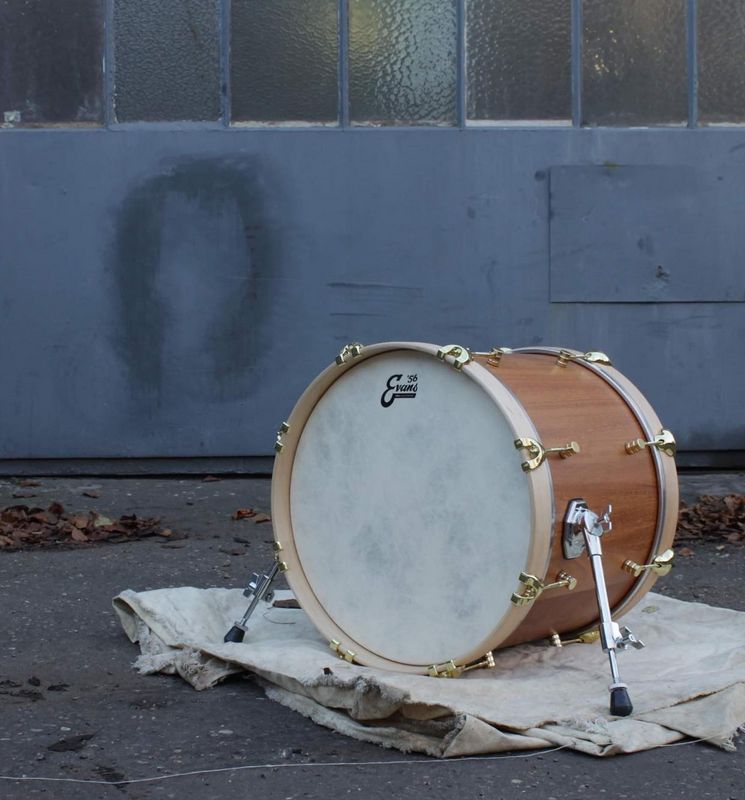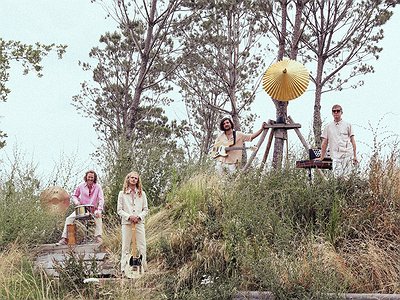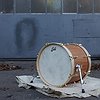Name: Kees Berkers
Nationality: Dutch
Occupation: Drummer, songwriter
Current release: YĪN YĪN's new album Mount Matsu is out January 19th 2024 via Glitterbeat.
Pure drum recording recommendations: It’s not pure drum and get’s pretty wild but try this one: Spiritual Emergency by Guardian Alien
If you enjoyed this interview with Kees Berkers of YĪN YĪN and would like to find out more about the band and their music, visit them on Instagram, Facebook, and tiktok.
What was your first drum set like and what are you using today? What, to you personally, are factors in terms of build and design that you appreciate in drums and percussion instruments?
I am still using the drumkit that I learned to play on. It’s a 70s Sonor jazz kit.
In general I like smaller, compact drumkits. A friend of mine called ‘mafketel’ makes his own drums from recycled woods. I find that really awesome!
Mafketel Drums (c) https://www.instagram.com/mafketeldrums/
Late Rush-drummer Neil Peart said: “The equipment is not an influence. It doesn't affect the way I play. It's an expression of the way I play.” What's your take on that?
For me the kind of drumkit does affect the way I play.
For example, if I play on a huge Ludwig kit I tend to go more bombastic-stadion-drumstyle. While on a small jazzkit you can be more subtle.
Drumming is an integral part of many cultures, and traditions. Which of these do you draw from in your playing – and why?
Every country has its own instruments and styles. African and South American rhythms are my favourites.
What were some of the main challenges in your development as a drummer / percussionist? Which practices, exercises, or experiences were most helpful in reaching your goals?
Progressing in skills and having a routine with drumming is a challenge. To become very good and learn to play new percussion instruments, you need hours of practice every week. Not having a rehearsal room and being distracted by life sometimes.
For a while, I noodled around for hours every day and that really helped me. And of course watching other drummers play.
How do you experience the concepts of "groove," "swing," and "rhythmic feel" in music?
It’s all just going with the flow. I don’t try to analyse it too much. The more I do that, the less groovy I play.
How do time signatures and tempo affect our perception of rhythm?
20 years ago I was very into math-rock. Like stepping into a maze I liked complicated rhythms and weird tempo changes. You get used to it and want more weirdness. At that point I could’t listen to ‘normal’ 4/4 rhythms, they bored me.
Over the last couple of years I've come to like simpleness and I concentrate more on sound, groove and dynamic.
What is the relationship between harmony, rhythm and melody? How do non-percussion instruments contribute to the overall rhythmic texture of a piece?
Great question!! Could probably write a book about it, but I won’t.
Cool thing about a lot of African music is that melody instruments are basically all doing polyphonic rhythms. The balaphone (sort of wooden xylophone) for example has a very short sustain. So they play repeating patterns to create harmony
Different drums have a distinct sound and drums and percussion are also timbral instruments. What drum sound are you aiming for and how are you making use of the timbral potentials and possibilities of your instruments?
I don’t have one perticular drumsound I’m aiming for. Depends on the mood.
In general it’s easier to make a small kit sound huge than making a big kit sound small. I try to combine different percussions and drum setups and fool around.
In relation to drumming, Stewart Copeland said: “Listening is where the cool stuff comes from. And that listening thing, magically, turns all of your chops into gold.” What do you listen for?
I guess while playing music it’s the trick to find a balance between playing from within, and listening to how it comes out.
Do you feel that honing your compositional / songwriting skills has an effect on your drumming skills?
When creating music for a longer time I learned to play more open, to leave room for other elements.
Starting out I always blasted so much that the songs couldn’t really breath. It’s easy to play loud and heavy for me. Difficult to be soft and simple. I learned that by recording lots of demos.
How has technology, such as drum machines and sequencers, impacted the way rhythm is created and perceived? Has it been a concrete influence on your own approach?
Absolutely. Aphex twin, Squarepusher and Venetian Snares changed my life and my way of perceiving rhythm. Also programming drums in Ableton really made me understand the beautiful math behind it.
It’s great to grab on to that, but also super nice to get off the grid and go with your instincts.
Physical strain is a particularly serious issue for many drummers. How does it manifest itself, how do you deal with it and in how far does it affect your creativity?
Can’t wait for technology to add robot limbs to the body. :)
Many recording engineers have remarked that the drums can be particularly hard to capture. What, from your perspective, makes drums sound great on record and in a live setting?
The room and your mood and confidence are most important for a good recording.
With YĪN YĪN we recorded drums with only a phone and pressed those recordings on vinyl.
Drums and percussion are remarkably often used for physical therapy / healing. What, from your point of view, makes them particularly suitable tools for this?
Syncing musically and spiritually with yourself and other people is the best healing for me.





